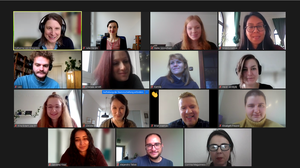Information About the Chair
Welcome to our website! Below you can find an overview about the Chair of Cognitive and Clinical Neuroscience. For more detailed information use the links in the text or the tabs above.
Chair of Cognitive and Clinical Neuroscience
The main aim of our research programme is to understand the sensory processes that enable us to communicate successfully with each other. In our experiments we acquire behavioural and neuroimaging data and employ neurostimulation techniques. We develop novel communication models based on findings in neurotypical participants and test model predictions on populations with developmental communication difficulties and patients with brain lesions. For more information see https://tu-dresden.de/mn/psychologie/kknw/forschung. For public media reports on our work see https://tu-dresden.de/mn/psychologie/kknw/die-professur/news/news_1
In our teaching we cover topics of cognitive and clinical neuroscience. For more information see https://tu-dresden.de/mn/psychologie/kknw/studium
Information on who we are can be found here. The team is led by Prof. Dr. Katharina von Kriegstein. Part of our group is based at the Max Planck Institute for Human Cognitive and Brain Sciences.
A full list of our publications can be found here. Some favourites are:
Tabas, A., Mihai, G., Kiebel, S., Trampel, R., & von Kriegstein, K. (2020). Abstract rules drive adaptation in the subcortical sensory pathway. Elife, 9.
Roswandowitz, Kappes, Obrig, von Kriegstein (2018). Brain, Volume 141, Issue 1, Pages 234–247 . Obligatory and facultative brain regions for voice-identity recognition Die Publikation erhielt den GNP-Nachwuchs-Förderpreis 2018
Müller-Axt, Anwander, von Kriegstein (2017). Current Biology 27, 3692-3698.e4. Altered Structural Connectivity of the Left Visual Thalamus in Developmental Dyslexia
Mayer, Yildiz, Macedonia, von Kriegstein (2015). Current Biology 25, 530-5. Visual and motor cortices differentially support the translation of foreign language words
Diaz, Hintz, Kiebel, von Kriegstein (2012). PNAS 109, 13841-6. Dysfunction of the medial geniculate body in dyslexia. Featured as Research Highlight in Nature Reviews Neuroscience 13, 667
Our work is supported by the European Research Council for the ERC-Consolidator Grant SENSOCOM (https://cordis.europa.eu/project/rcn/199655_en.html), the German Research Foundation (http://www.dfg.de/), and the TU Dresden. Further information on funding can be found here.

